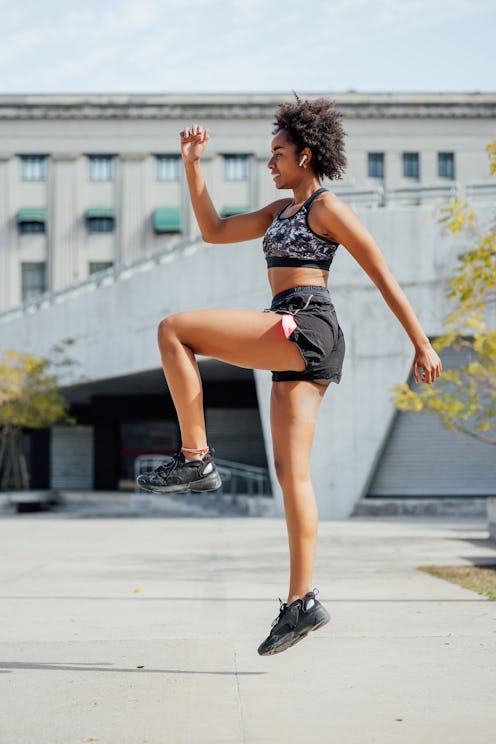Shutterstock
While you may think the best way to get better at running is to lace up and hit the pavement as often as possible, it actually helps you more if you do cross-training — which means doing other types of exercise outside your usual routine, explains trainer Jesse Feder.
Shutterstock
Why Cross-Train?
Cross-training is a way to complement your running and target different movement patterns than the ones you’re already repetitively engaging in, adds sports chiropractor Dr. Sandy Baird, DC. This helps prevent muscle imbalance and injury and improves performance.
Shutterstock
The Best Modalities
To support your running, try yoga, swimming, strength training, and HIIT workouts, says Baird: yoga for stretching and mobility, swimming for extra cardio, strength training to build the muscles used during a run, and HIIT to support anaerobic activity.
Shutterstock
Always Stretch
Your cross-training regimen should include plenty of stretching. “Many runners don’t build in other time throughout their week to work on flexibility or mobility, or even mindfulness/meditation,” Baird says. A yoga practice offers space for staying limber.
Shutterstock
Do Low-Impact Cardio
To support your run, you can also hop on the elliptical or stairclimber. “These target [the hips and glutes] and make running on the trails and hills easy,” says trainer Elliott Torsney. Both are low-impact ways to train your cardio on “off” days.
Shutterstock
Take Breaks From Running
Swimming and cycling are also ideal ways to give your joints a break from high-impact runs. “This can be important if you’re new to running and [don’t want to] stress your tendons and ligaments,” says exercise physiologist Todd Buckingham, Ph.D.
Shutterstock
Focus On The Glutes
Since the glutes drive your run and push you forward, look for exercises that target them. Baird recommends moves like barbell hip thrusts and glute bridges. Aim for three sets of 8 to 12 reps and gradually add heavier weights over time.
Shutterstock
Strengthen The Lower Body
Work on your lower body strength to support the muscles used when you run. Feder suggests doing squats one to two times a week with a medium weight and high reps. “This will strengthen the glutes and quads as well as improve muscle endurance,” he says.
Shutterstock
Try Plyometrics
Plyometrics can come in handy, too. “I would add in box jumps the same days you’re doing squats,” Feder says. The exercise move can improve leg explosiveness, he explains, which is good for sprinters and can also improve speed at the start of a race.
Shutterstock
Sample Strength Routine
Cross-train with this workout from Feder:
- Barbell squats, medium weight, 10 reps.
- Box jumps, 10 reps.
- Calf raises till you get tired.
- Banded hip abductions, 10 reps per leg.
- Band hip adductions, 10 reps per leg.
- Repeat 3 sets.
Olelole/E+/Getty Images
Weekly Cross-Training Plan
Try this plan from Baird:
- Sat: Long run.
- Sun: Yoga + active rest.
- Mon: Full-body strength train.
- Tues: Short run + 15 minutes of yoga.
- Wed: Full-body strength train.
- Thurs: Short run, HIIT, or swim 15 mins.
- Fri: Full-body strength train.
